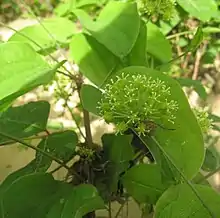Smilax herbacea
Smilax herbacea, the smooth carrionflower[2] or smooth herbaceous greenbrier, is a plant in the catbriar family. It is native to eastern Canada (Quebec, Ontario, New Brunswick) and the eastern United States (as far south as Georgia and Alabama).[3][4] Its preferred natural habitat is rich forests, and riparian thicket and meadows.[5]
| Smilax herbacea | |
|---|---|
 | |
| Scientific classification | |
| Kingdom: | Plantae |
| Clade: | Tracheophytes |
| Clade: | Angiosperms |
| Clade: | Monocots |
| Order: | Liliales |
| Family: | Smilacaceae |
| Genus: | Smilax |
| Section: | Smilax sect. Nemexia |
| Species: | S. herbacea |
| Binomial name | |
| Smilax herbacea | |
| Synonyms[1] | |
|
Synonymy
| |
Description
Smilax herbacea is a vine with alternate, simple leaves, on climbing stems. The flowers are green, borne in spring. The plant at first looks like asparagus when it first sprouts out of the ground. The plant can grow over 8 feet tall without support, but will eventually fall over unless it successfully finds external support.[5]
 Flower in bud
Flower in bud Young sprout at 2' height
Young sprout at 2' height Line drawing showing floral details
Line drawing showing floral details
Uses
Food
The species can be used to prepare food in the same fashion as Smilax bona-nox and Smilax rotundifolia.[6]
References
- Kew World Checklist of Selected Plant Families
- "Smilax herbacea". Natural Resources Conservation Service PLANTS Database. USDA. Retrieved 16 November 2015.
- Kew World Checklist of Selected Plant Families
- Biota of North America Program 2014 county distribution map
- Flora of North America Vol. 26 Page 473 Carrion-flower, Jacob’s-ladder, smilax herbacé, Smilax herbacea Linnaeus, Sp. Pl. 2: 1030. 1753.
- Elias, Thomas S.; Dykeman, Peter A. (2009) [1982]. Edible Wild Plants: A North American Field Guide to Over 200 Natural Foods. New York: Sterling. p. 66. ISBN 978-1-4027-6715-9. OCLC 244766414.
- Batchelor, John; Miyabe, Kingo (1893). "Ainu economic plants". Transactions of the Asiatic Society of Japan. XXI: 212.